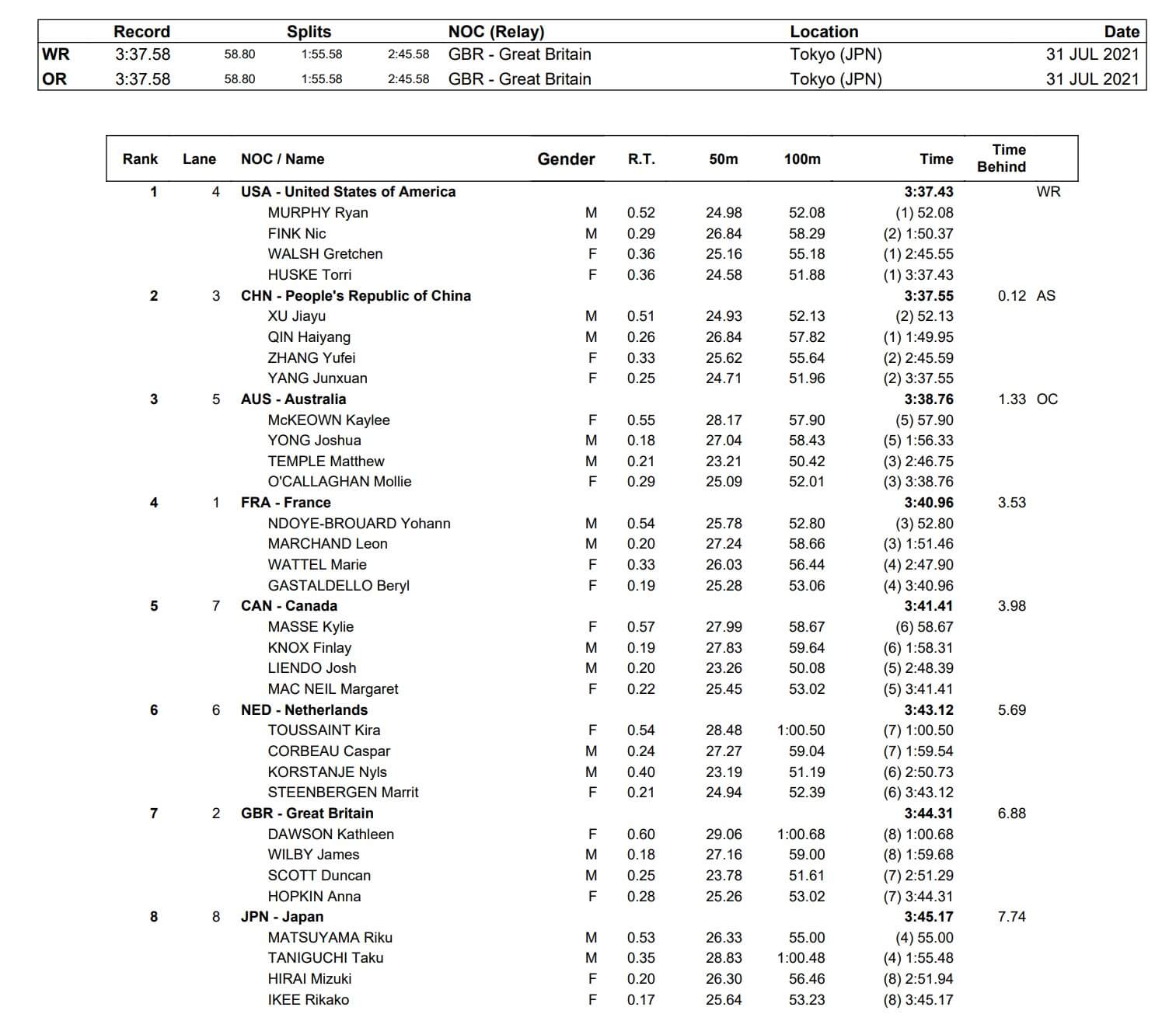Paris Olympics, Day 8 Finals: USA Rips World Record to Clip China in Epic Mixed Medley Relay

Paris Olympics, Day 8 Finals: USA Rips World Record to Clip China in Epic Mixed Medley Relay
Since the 400-meter mixed medley relay was introduced to the sport at the 2015 World Championships, the event has provided consistent action and intrigue. Such is the nature of a discipline that combines two men and two women, with vast swings in placement the norm over eight laps.
The Olympic Games offered the best edition yet on Saturday night.
Dueling for the entirety of the race, the United States and China both dipped under the previous world record, but it was the American squad of Ryan Murphy, Nic Fink, Gretchen Walsh and Torri Huske that narrowly prevailed, thanks to a global standard of 3:37.43. That time bettered the 3:37.55 of China, and went under the world record of 3:37.58, set by Great Britain at the 2020 Olympic Games in Tokyo.
Walsh started the night session by finishing second in semifinals of the women’s 50 free, but the main focus won on the night’s final.
“I think this was the biggest job I had tonight, so it was the main focus,” she said. “I was just really proud of myself and our whole relay and the prelims relay for everything we did. We got the world record, we got number one, we’re on the podium with our golds. It was a pretty special moment.”
China’s foursome of Xu Jiayu, Qin Haiyang, Zhang Yufei and Yang Junxuan was terrific, with the unit going .03 quicker than the prior world mark and setting an Asian record. Picking up the bronze medal was Australia, which relied on the team of Kaylee McKeown, Josh Yong, Matt Temple and Mollie O’Callaghan. Australia touched in 3:38.76 for an Oceania record.
This Games marked just the second time the mixed medley relay has been held at the Olympics, and the outcome was a significant change for the United States from what transpired in Tokyo. Three years ago, Team USA was fifth and more than a second shy of reaching the podium. That result caused debate, as the U.S. was the only country to use a female breaststroker and lost considerable ground on a stroke that is the slowest in the sport and, therefore, led to a larger deficit to the teams using a male athlete on the leg.
On the penultimate night of competition at La Defense Arena in Paris, the American coaching staff made all the right moves, going with the male-male combo of veterans Murphy and Fink, and having Walsh and Huske clinch the gold in down-to-the-touch fashion. Given the way China performed, those decisions needed to be on target. At no point during the final were the U.S. and China separated by more than .42.
Murphy and Xu got things started on the leadoff backstroke leg with a stroke-for-stroke duel that was an indicator of what was to unfold. After Xu held a slight lead at the turn, Murphy was able to get his hand on the wall first at the opening exchange, going 52.08 to the 52.13 of his Chinese foe.
China battled back to take the lead at the midway point of the race, thanks to Qin splitting 57.82 on the breaststroke leg, compared to the still strong 58.29 of Fink. The 2023 world champion in the 100 breaststroke, Qin was only seventh in that event in Paris, but he came through in relay duty, producing a time that was more than a second faster than the 59.50 he managed in his seventh-place individual showing.
China went into the butterfly leg holding a 1:49.95 to 1:50.37 margin, only to see that edge turn into a .04 deficit. Walsh, who was the silver medalist in the 100 butterfly, blasted a split of 55.18 for the third leg, while Zhang went 55.64. Walsh’s contribution was followed by Huske continuing the meet of her career. Pressured by Yang, Huske came up with a freestyle anchor split of 51.88, which was .08 quicker than the 51.96 of Yang, and ensured the U.S. had gold.
“This meet has been great,” Huske said. “And this meant so much to me, the world record with these three is just unbelievable. I feel like they make it so easy to be confident, because they’re the best in the world. So I’m just so lucky that I get to have them by my side.”
Rare are the occasions when showdowns deliver eight sensational legs, all members of the relays doing what was required. That scenario unfolded and sent the meet into its final day on a major uptick.
Australia’s bronze medal was the second of the night for McKeown, who earlier took third place in the 200 individual medley. Initially fourth at the finish, McKeown was bumped up to the podium when Alex Walsh was disqualified for going beyond vertical on the backstroke to breaststroke turn. In her second race of the night, McKeown jumpstarted the Aussies with a 57.90 backstroke leadoff.
The evening results affected a couple of all-time Olympic medals lists. With Caeleb Dressel taking care of the butterfly leg during prelims, the American now has nine career gold medals, tying him for No. 2 in history. Dressel shares that spot with fellow swimmers Katie Ledecky, who increased her total to nine with a win in the 800 freestyle on Saturday, and Mark Spitz. The group also includes Finland’s Paavo Nurmi (track), the Soviet Union’s Larisa Latynina (gymnastics) and American track and field star Carl Lewis. Michael Phelps holds the record with 23 gold medals.
Australia’s bronze medal raised the career-medals total of Emma McKeon to 13, which is one less than Ledecky for the most by a female swimmer. McKeon raced in prelims of the mixed medley relay and will have a chance to tie Ledecky when she handles the butterfly leg on Australia’s women’s medley relay on Sunday.
France was fourth and had four-time Paris Games gold medalist Leon Marchand swim the breaststroke leg, where he went 58.66.


- EVENT PAGE
- SCHEDULE
- VENUE
- STREAMING INFO
- DAY 1 PRELIMS RESULTS
- DAY 1 FINALS RESULTS
- DAY 2 PRELIMS RESULTS
- DAY 2 FINALS RESULTS
- DAY 3 PRELIMS RESULTS
- DAY 3 FINALS RESULTS
- DAY 4 PRELIMS RESULTS
- DAY 4 FINALS RESULTS
- DAY 5 PRELIMS RESULTS
- DAY 5 FINALS RESULTS
- DAY 6 PRELIMS RESULTS
- DAY 6 FINALS RESULTS
- DAY 7 PRELIMS RESULTS
- DAY 7 FINALS RESULTS
- DAY 8 PRELIMS RESULTS
- DAY 8 FINALS RESULTS
- DAY 9 FINALS RESULTS




Why do we need mixed relays! We have men and women racing and they are both amazing but different races. Now we have transgender people racing? This is just wrong mixing them together. What will happen next!